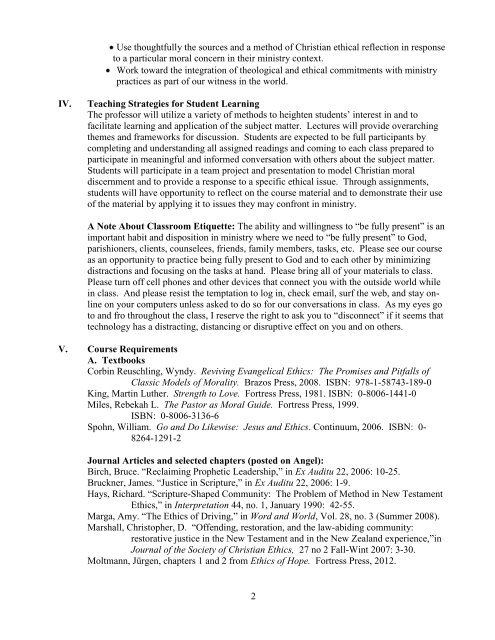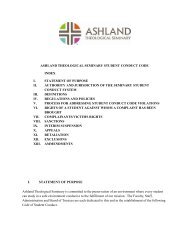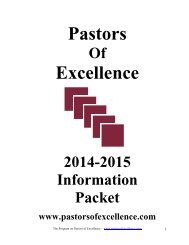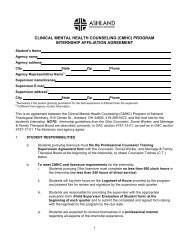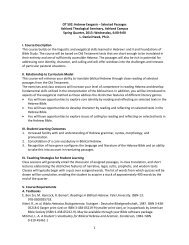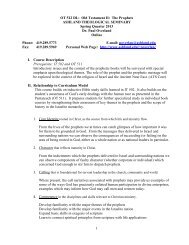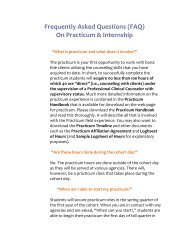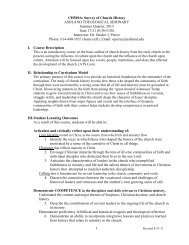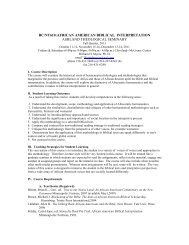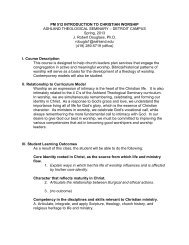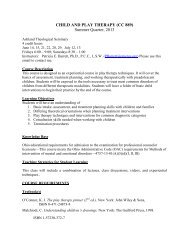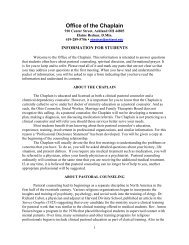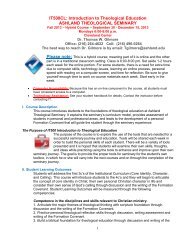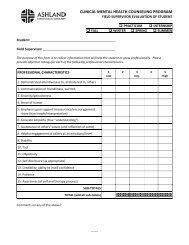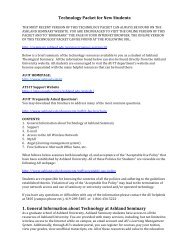Course Number: Course Name - Ashland Theological Seminary
Course Number: Course Name - Ashland Theological Seminary
Course Number: Course Name - Ashland Theological Seminary
Create successful ePaper yourself
Turn your PDF publications into a flip-book with our unique Google optimized e-Paper software.
Use thoughtfully the sources and a method of Christian ethical reflection in responseto a particular moral concern in their ministry context.Work toward the integration of theological and ethical commitments with ministrypractices as part of our witness in the world.IV.Teaching Strategies for Student LearningThe professor will utilize a variety of methods to heighten students’ interest in and tofacilitate learning and application of the subject matter. Lectures will provide overarchingthemes and frameworks for discussion. Students are expected to be full participants bycompleting and understanding all assigned readings and coming to each class prepared toparticipate in meaningful and informed conversation with others about the subject matter.Students will participate in a team project and presentation to model Christian moraldiscernment and to provide a response to a specific ethical issue. Through assignments,students will have opportunity to reflect on the course material and to demonstrate their useof the material by applying it to issues they may confront in ministry.A Note About Classroom Etiquette: The ability and willingness to “be fully present” is animportant habit and disposition in ministry where we need to “be fully present” to God,parishioners, clients, counselees, friends, family members, tasks, etc. Please see our courseas an opportunity to practice being fully present to God and to each other by minimizingdistractions and focusing on the tasks at hand. Please bring all of your materials to class.Please turn off cell phones and other devices that connect you with the outside world whilein class. And please resist the temptation to log in, check email, surf the web, and stay onlineon your computers unless asked to do so for our conversations in class. As my eyes goto and fro throughout the class, I reserve the right to ask you to “disconnect” if it seems thattechnology has a distracting, distancing or disruptive effect on you and on others.V. <strong>Course</strong> RequirementsA. TextbooksCorbin Reuschling, Wyndy. Reviving Evangelical Ethics: The Promises and Pitfalls ofClassic Models of Morality. Brazos Press, 2008. ISBN: 978-1-58743-189-0King, Martin Luther. Strength to Love. Fortress Press, 1981. ISBN: 0-8006-1441-0Miles, Rebekah L. The Pastor as Moral Guide. Fortress Press, 1999.ISBN: 0-8006-3136-6Spohn, William. Go and Do Likewise: Jesus and Ethics. Continuum, 2006. ISBN: 0-8264-1291-2Journal Articles and selected chapters (posted on Angel):Birch, Bruce. “Reclaiming Prophetic Leadership,” in Ex Auditu 22, 2006: 10-25.Bruckner, James. “Justice in Scripture,” in Ex Auditu 22, 2006: 1-9.Hays, Richard. “Scripture-Shaped Community: The Problem of Method in New TestamentEthics,” in Interpretation 44, no. 1, January 1990: 42-55.Marga, Amy. “The Ethics of Driving,” in Word and World, Vol. 28, no. 3 (Summer 2008).Marshall, Christopher, D. “Offending, restoration, and the law-abiding community:restorative justice in the New Testament and in the New Zealand experience,”inJournal of the Society of Christian Ethics, 27 no 2 Fall-Wint 2007: 3-30.Moltmann, Jürgen, chapters 1 and 2 from Ethics of Hope. Fortress Press, 2012.2


